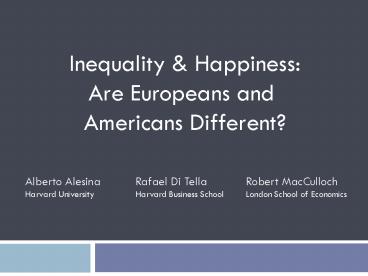Inequality - PowerPoint PPT Presentation
1 / 10
Title:
Inequality
Description:
state, role of democratic institutions, role of social norms. Why is happiness data valid? ... 'exercises' (i.e. physiological tests) Income redistribution ... – PowerPoint PPT presentation
Number of Views:27
Avg rating:3.0/5.0
Title: Inequality
1
Inequality Happiness Are Europeans and
Americans Different?
Alberto Alesina Rafael Di Tella Robert
MacCulloch Harvard University Harvard Business
School London School of Economics
2
Happiness Economics
- goal is to determine from what sources people
derive - their well-being
- measures of happiness can then be used in
formulating - government policy on economic issues
Satisfaction with Life index Green
happiest Blue Pink Orange Red least happy
3
Determinants of happiness
- Micro happiness marital status, education,
employment, income - Macro happiness aggregate unemployment, size
of welfare - state, role of democratic institutions, role of
social norms
- Why is happiness data valid?
- widely used by psychologists
- data has passed through validation
- exercises (i.e. physiological tests)
4
Income redistribution
- Share of total government
- spending over GDP
- Europe 44
- U.S.A. 30
- Democratic governments
- redistribute according to
- popular support
5
The Study
- Does income inequality affect individual
happiness even - after controlling for other factors? Why or why
not? - correlated 128,106 happiness responses to Gini
- coefficients for Europe and the U.S. over two
decades - evaluated sample across income and ideological
lines
6
Survey questions
- U.S. General Social Survey (1972-1994)
- Taken all together, how would you say things are
these dayswould you say that you are - Very happy
- Pretty happy
- Not too happy
- Euro-Barometer Survey Series (1975-1992)
- On the whole, are you
- Very satisfied
- Fairly satisfied
- Not very satisfied
- Not at all satisfied
- with the life you lead?
7
Results
- Strong correlation between inequality and
happiness in Europe, - but not in the U.S.
- 10 increase in the
- Gini coefficient
- reduces the very
- happy category
- by 5.2 in Europe,
- 2.5 in the U.S.
8
- Happiness of the European poor and the European
left is - strongly affected by inequality
- Increase in one standard deviation of the Gini
coefficient - diminishes the very happy by 3.6 among the
poor, - and 4.7 among the left
- None of the U.S. groups (poor, rich, right, or
left) experiences - significant inequality generated unhappiness
- Only exception
- a sub-group of
- rich leftists
9
Analysis
- Europeans prefer more equality
- and social harmony
- Income equality is a
- luxury good
- Social mobility is (or is perceived
- to be) higher in the U.S.
- Present inequality has
- no bearing on future
- well-being
10
Questions
- Correlation
- Sources other than a European preference for
equality and American social mobility may explain
the findings
causality?































